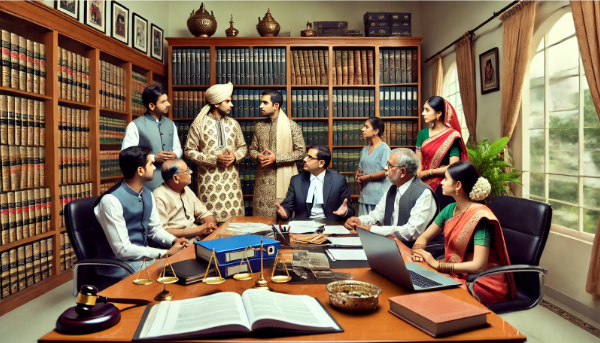The concept of family businesses isn’t a new one for India. In cities like Delhi, it is quite common to come across centuries-old family businesses. “Ghar- ki dukaan” speaks to trust, shared ideals and values, and of course, tradition. But family-owned businesses are not invincible, they too have their own set of problems, most notably intra-family feuds.
These intra-family problems aggravate the decision-making facets of the business because the emotional quotient is very high as opposed to the emotional detachment seen in nonfamily enterprises. Bansari Rao Delhi, a practicing law firm with core competencies in family-owned businesses, comes in here to assist in the resolution of conflicts so that both the business and family are unaffected.
Table of Contents
Understanding the Nature of Family Business Disputes
Family businesses are likely to face unpleasant strains. It can be said with some confidence that the sources of family business conflicts are many but can be distilled into recurrent common denominators which include;
- Ownership and Succession:
Ownership transfer and succession raise the most conflict in family businesses. The burning question of who takes over the business or what the ownership structure will look like is guaranteed to spark quarrels. The lack of accord among family members about plans of succession can cause divisions among family members when some feel overlooked or unappreciated. - Management Disagreements:
If family members are in the operations business, then, it is a family business. However, conflicts arise when management’s priorities and opinions about crucial decisions do not match. Innovations in style and method among the younger generation and the age-old members’ indifference to change raise conflicts. - Profit Distribution:
Today, family conflict regarding profit understanding or sharing leaves many at a crossroads. So in many family-owned businesses where ‘not all family members work equally in the’ there is an equal distribution of profit story, it does not work. Conflict and litigation over an appropriate compensation system and reward sharing which have not been effectively managed easily recurs. - External Influences:
The externals can also be due to marriages, divorces, or even the non-familial employees who can add on the existing feuds or create new ones. It is quite common for a spouse or an in-law to baselessly meddle in company business and therefore sociologically interfere within the family space.
Expert Legal Advice from Bansari Rao Delhi: How to Resolve Family Business Disputes
There are, the fact is family business relationship disputes are more complex hence everyone ought to understand the need for legal representation to facilitate the resolution of such disputes in a manner that protects business and family ties. Legal assistance is available for family-owned businesses from Bansari Rao Delhi family attorney who appreciates the intricacies of family matters and the existence of legal boundaries.
- Clear Succession Planning:
To Bansari Rao Delhi, the gentle reminder to business succession planning for families is how to draw clear lines for the ownerships. The firm makes certain that there are few conflicts over the transition of authority or control by assisting families in specifying roles, duties, and ownership rights in advance. An effective succession plan also explains how decisions can be made and what takes place in case of retirement, sickness, or death which provides peace of mind to all family members being involved. - Conflict Resolution Mechanisms:
In addition to that, Rao Bansari Delhi also provides assistance in formalizing the conflict resolution structures for family businesses. These usually involve including mediation and arbitration clauses so as to avoid disputes that may later on end up in litigation which is costly and time-consuming. The firm emphasizes on the open communication of issues around family members so that they do not develop into more serious problems making sure that conflicts are addressed in a speedy and peaceful manner. - Profit Sharing Agreements:
To avoid conflicts relating to the aspects of how much profit will every business partner receive, Rao Bansari Delhi proposed agreements concerning the sharing of the group’s profits which in turn subdues the possibility of conflicts. The division of the profits is based on how much being devoted by each member of the family is, and such agreements are to be established from the beginning. Since such windows are signed, families lessen the chances of conflicts so that everyone gets what they agreed. - Incorporating Non-Family Members:
When there are non-family employees or advisors involved in family business, Rao Bansari Delhi provides assistance in developing the contracts that can safeguard interests of both family and business. This entails setting up the family members and non-family members roles and clarifying to the non-family staff members their roles in the company so as to avoid interference with the family.
Preserving Family Harmony While Protecting the Business
A firm such as Bansari Rao Delhi is invaluable for bearing in mind not only the legal dimensions of family business conflict, but also the emotional and relational factors. The firm acknowledges that family ties cannot be dealt with as a mere legal issue, hence their view towards family is that of resolving conflicts in a comprehensive manner.
There are distinct challenges faced by each family business, affirms Ravi Rao, a senior partner at Bansari Rao Delhi. ‘However, our objective is to ensure families resolve these issues in a manner that protects the family business, and the family itself. It is a tough act, but it can be done with the right legal strategy and communication.
Preventing Disputes Before They Start
Bansari Rao advocates for the concept of preparing legally in advance to avoid areas of concern that may plague the family business in the future. There is a saying that the best way to deal with a problem is to prevent it from arising in the first place. It is vital that policies, decisions, and legal agreements are in existence at the time of the commencement of a family firm to prevent further conflicts.
“The encouragement of the family’s thinking should be from a generational perspective,” emphasizes Rao. “It is not what happens today or tomorrow – it is the business’s ability to transcend generations. Legal planning definitely plays an important part in that process.”
Looking to the Future: How Bansari Rao Delhi Continues to Support Family-Owned Businesses
The legal tools to guard family-owned businesses must also adapt in tandem with the changes these businesses experience in the world. As part of its family business law practice, Bansari Rao Delhi provides up-to-date services to its clients in accordance with the family business enterprises’ needs. From dealing with complex taxation, helping businesses digitize, or putting in place a seamless succession, the firm has been an integral part of family businesses in Delhi.
Bansari Rao Delhi thus combines legal knowledge with an understanding of families’ intra-relationships, enabling them to offer a relevant service that many businesses require to be able to protect their name and existence for many generations.

Rachael Villam is a certified crypto zealot, finance writer, and a steady swing trader. She is passionate about blockchain’s capacity to transform cities, commerce, and the entire banking system as we know it. Dune bashing, camping, and working with kids are his non-crypto interests.

